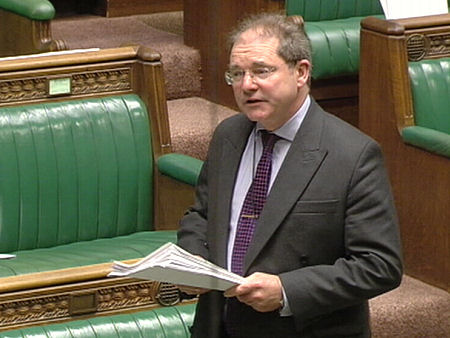4 May 2011
During a late-night (4am!) back bench MP's debate on the role of the Special Representative for International Trade and Investment, Geoffrey Clifton-Brown highlights the benefits of the role from his experience as a previous Shadow Trade Minister.
Geoffrey Clifton-Brown (The Cotswolds) (Con): I am not entirely clear, listening to the hon. Gentleman’s line of reasoning, whether he has called this debate obliquely to criticise Prince Andrew in his role as special envoy, or whether he has called it to query whether we need a special envoy at all. In my experience, having done the shadow trade job, Prince Andrew goes round the world, opens a lot of doors and does a lot of trade for the UK, and I would have thought that the hon. Gentleman’s constituency needed the jobs that are created by businesses that export round the world.
Paul Flynn: That is a wonderful example of how the hon. and learned Gentleman is free to praise the person involved, while I am denied the opportunity to attach any blame to him. It is entirely irrational and anti-intellectual, and contrary to the debating freedoms of this House that I am not allowed to answer his question or repeat the criticism that has appeared in almost all our national newspapers and media of the way in which that role is performed. I cannot do that, and that is the weakness that I wish to attack in this debate. I can, however, talk about the role and the opinion of certain serious people.
| Hansard
...
Geoffrey Clifton-Brown: I am listening carefully to what the hon. Gentleman has to say, but I must say that I am not entirely clear—perhaps he will enlighten the House—whether the purpose is to debate the role of our individual special envoy, to raise the question of whether we need a special envoy or to debate British trade policy and which countries we should or should not trade with. Will the hon. Gentleman enlighten us?
Paul Flynn: It is all those things: the question of whether we need a special envoy and whether it is beneficial or not. Within the limits I have set out, I am able only to point obliquely to my view that it is perhaps not always beneficial to have one. If we have one, that person should not be chosen merely on the basis of what advantages he or she has inherited, and the choice should not be limited to a single family. There should be open competition, so that we can acquire someone who can do the job in the manner that is required. It should not involve work that can be done far more effectively by ambassadors who know their countries and know what the opportunities are.
| Hansard
Geoffrey Clifton-Brown (The Cotswolds) (Con): I am not entirely clear, listening to the hon. Gentleman’s line of reasoning, whether he has called this debate obliquely to criticise Prince Andrew in his role as special envoy, or whether he has called it to query whether we need a special envoy at all. In my experience, having done the shadow trade job, Prince Andrew goes round the world, opens a lot of doors and does a lot of trade for the UK, and I would have thought that the hon. Gentleman’s constituency needed the jobs that are created by businesses that export round the world.
Paul Flynn: That is a wonderful example of how the hon. and learned Gentleman is free to praise the person involved, while I am denied the opportunity to attach any blame to him. It is entirely irrational and anti-intellectual, and contrary to the debating freedoms of this House that I am not allowed to answer his question or repeat the criticism that has appeared in almost all our national newspapers and media of the way in which that role is performed. I cannot do that, and that is the weakness that I wish to attack in this debate. I can, however, talk about the role and the opinion of certain serious people.
| Hansard
...
Geoffrey Clifton-Brown: I am listening carefully to what the hon. Gentleman has to say, but I must say that I am not entirely clear—perhaps he will enlighten the House—whether the purpose is to debate the role of our individual special envoy, to raise the question of whether we need a special envoy or to debate British trade policy and which countries we should or should not trade with. Will the hon. Gentleman enlighten us?
Paul Flynn: It is all those things: the question of whether we need a special envoy and whether it is beneficial or not. Within the limits I have set out, I am able only to point obliquely to my view that it is perhaps not always beneficial to have one. If we have one, that person should not be chosen merely on the basis of what advantages he or she has inherited, and the choice should not be limited to a single family. There should be open competition, so that we can acquire someone who can do the job in the manner that is required. It should not involve work that can be done far more effectively by ambassadors who know their countries and know what the opportunities are.
| Hansard

